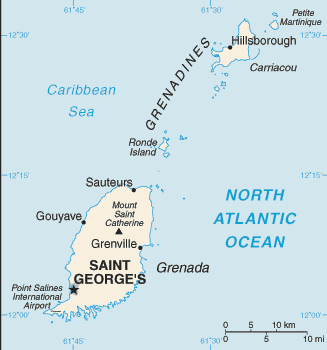
An overly creative immigration lawyer, seeing the years-long backlog for EB-5 visas for the Chinese, has suggested using the immigration policy of a tiny island nation, Grenada, to maneuver around U.S. immigration rules.
The EB-5 program is for passive alien investors, giving them a family-sized bunch of green cards in return for a $500,000 investment in a scheme OK'd by, but not guaranteed by, the Department of Homeland Security. The price is so low, and the benefit (permanent residence in the United States) is so generous, that rich and insecure Chinese have gobbled up all the visas available (to Chinese aliens), creating a huge waiting list for these numerically limited documents. There are 10,000 of them granted annually, world-wide, and given the elements of the immigration law intended to promote diversity in the flow, there are provisions against too many people entering from the same country (any country) on any given visa. So there is a backlog, but just confined to applicants from China.
Instead of regarding the situation as a natural byproduct of our nation's now 96-year-old policy of numerical limits on some migrant streams, Philadelphia lawyer Matthew Galati has concocted a proposal that plays on: a poverty stricken Caribbean island's desire for foreign cash, its willingness to grant full citizenship to absent investors, its commerce treaty with the United States, the lack of a similar treaty between the U.S. and China, an obscure U.S. State Department program for nonimmigrant investors, and an assumption that State will not see through all this gamesmanship.
Galati's idea — and I give him high marks for ingenuity in promoting a questionable cause — would seem to work like this:
- An alien from China who has already plunked down the half a million for the set of green cards and is at the wrong end of the waiting list would also pay Grenada $200,000 for citizenship for the investor, the investor's spouse, and their two kids (other children can be added to the list for $25,000 each);
- The new Grenadian citizen would then take advantage of the existing treaty between Grenada and the United States that permits the issuance of E-2 (treaty investor) visas to citizens of Grenada (there is no such U.S.-China treaty);
- The new Grenadian citizen would then invest in a business in the United States that he or she would run that would meet the E-2 requirements (Galati is silent on the business-management part); and then
- The Chinese/Grenadian family would then move to the United States and keep renewing their E-2 visas (which would allow all of them to work) until such time as the EB-5 visas become available.
To pull off this maneuver, the family would have to make two investments (for the EB-5 and the E-2 arrangements) and make a one-time payment to Grenada of $200,000. But there are two problems that Galati ignores; the first is that while EB-5 needs only a passive investment, the E-2 visa requires the actual and active management of a business.
Yes, it all sounds like a burlesque of the grocery store offering three cans of beans for the price of one; the offer here is that you can buy one visa for the price of three: the payment to Grenada, the E-2 investment, and the EB-5 one. Why make a single payment to buy your way into another country, when you can pay three times?
The second potential problem not mentioned by Galati is that the State Department might not see the Grenadian/Chinese investors as genuine Grenada citizens. I learned the history of this sort of thing years ago when I was the very part-time U.S. correspondent for the Fiji-based Pacific Islands Monthly. (Rupert Murdoch, its owner, killed the little newsmagazine after I left it.)
The Kingdom of Tonga in the South Pacific some years ago sensed a market for its passports among the Hong Kong Chinese, at a time when both places had ties to the UK. It started selling them not for a fixed price, but for whatever the market would bear, an unusual situation. At first the United States recognized these passports, but then it became apparent that the passports could not be used to visit, or live in Tonga.
The State Department decided that these were not really passports, and refused to honor them.
Skip ahead a decade or so, and move thousands of miles to a different, poor, corrupt island government, that of the quasi-nation the Republic of the Marshall islands (RMI). It, too, started selling its citizenships to rich Chinese, who bought hoping to use their new RMI status to move to the United States, an automatic right for the island nation's citizens. The State Department ruled, however, that to be a genuine citizen of the Marshalls you had to follow the local rules and live there for five years before you became a RMI citizen and before your could use RMI citizenship to enter the United States.
The market for these passports instantly disappeared.
Might something similar happen to the convoluted Grenadian scheme? Let's hope so.
